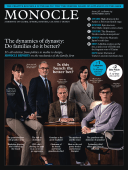
Issue 38
In our November issue we examine the dynamics of dynasties.
In This Issue
Oops! No content was found.
Looks like we no longer have content for the page you're on. Perhaps try a search?
Return Home
Daily inbox intelligence from Monocle

In our November issue we examine the dynamics of dynasties.
Looks like we no longer have content for the page you're on. Perhaps try a search?
Return Home